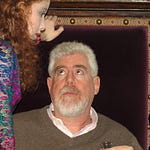Owned by half the human race yet often shrouded in shame, secrets and lies, the (mostly) female sexual anatomy finally gets the scrutiny and plain talk it deserves. Author Zoe Mendelson discusses the heroic, misunderstood pussy.
* FULL TRANSCRIPT *
TEDDY ROOSEVELT: Surely there never was a fight better worth making than the one which we are in.
BOB GARFIELD: Welcome to Bully Pulpit. That was Teddy Roosevelt, I'm Bob Garfield. Once there was the encyclopedia. The digital age gave us Wikipedia and a whole mess of other online information repositories from Investopedia, to Baby Names Pedia, to Pancreapedia, for one stop shopping on all things pancreas, to Conservapedia, for evangelical Christians sick of being brainwashed with science and facts.
MAN: Wikipedia has become unsuitable because it's become very biased. It's become very anti-American. It's become very anti-Christian.
GARFIELD: After four years of online collaboration by 200-some contributors on three continents, we now have a hardcover book titled Pussypedia, about the anatomy, physiology, culture and fraught history of the mostly female organs and structures for reproduction, urology and pleasure. The book is learned, informative, poignant, often infuriating, and often also very funny. But what most distinguishes Pussypedia is that it's an FAQ for questions that have been answered incorrectly suppressed, deemed taboo, gone bizarrely uninvestigated and/or steeped in shame off and on for most of human history. Just for one meager example, this 1969 educational film strip from a right-wing organization agitating against sex education.
NARRATOR: Every emotional and psychological aspect of sex is presented. But without the introduction of any moral concepts of right and wrong. Sexual intercourse between unmarried young people is presented as acceptable. Masturbation is not only acceptable, but a desirable means of relieving tension. Having an illegitimate baby is nothing to be ashamed of. Youths are instructed in use of every manner of contraceptive device and may obtain them without cost. But moral concepts of right and wrong rejected.
GARFIELD: To my knowledge, there is no comparable screed associated with pancreas information. Into this environment enters Pussypedia, illustrated by Maria Conejo and written by Zoe Mendelson, who joins me now. Zoe, welcome to Bully Pulpit.
ZOE MENDELSON: Thank you. Thanks for having me.
GARFIELD: OK, let's start with the title. It isn't Vaginapedia, although that is the body part most associated with the slang word pussy. Isn't that like calling every Baltic state Lithuania?
MENDELSON: Yes, it is. Yes, totally. The vagina is only the tube that connects the, the uterus to the outside. It's only the vaginal canal. So when we call the whole thing a vagina, leaving out a lot of really important parts. Also it means swordholder. So we're really calling our vaginas like that thing that's made to hold a penis.
GARFIELD: It only exists in relationship to male equipment.
MENDELSON: Right. And it's not an object of service to the penis.
GARFIELD: The book itself is part sex manual, part comprehensive Mendelson's anatomy of XX plumbing and part history of suppression. You cite just absolutely infuriating examples of misogynistic superstition, religious orthodoxy, sexual repression and a sort of moral fascism that has come in waves over the centuries to inflict shame and to propound ignorance. Can you give me just some lowlights?
MENDELSON: I think that the best example is the history of the erasure of the clitoris, and that can mean erasure conceptually, it can mean clitoridectomies becoming popular. As late as in the 20th century, people were performing clitoridectomies because masturbation was being blamed for all sorts of health ailments.
GARFIELD: And you're talking about in the West, you're not talking about sub-Saharan Africa.
MENDELSON: In Europe and in the United States. I mean, the clitoris has been known about since ancient times. And there was many times throughout the history of medicine where people said, well, what's this thing? And authorities in anatomy said, nothing, nothing. Don't ask about it. For a long time it was because the clitoris didn't fit into this model that we, that we had, which was that the vagina was just an inside out penis. When a fetus is growing, the genital clump either becomes a penis or a clitoris and they're made of the exact same parts. A clitoris is about nine centimeters flaccid on average, which is the same for a penis. But they thought that the vagina was an inside out kind of messed up penis gone wrong. So it didn't fit into that model, which is why for a long time they didn't want to acknowledge its existence even though they knew it was there.
GARFIELD: Who's they?
MENDELSON: Authorities on anatomy and biology. One of my favorite texts from a guy that dug it up — in 17-something — he wrote that he was really surprised that it hadn't been priorly documented since it was so perceptible to sight and touch. Kind of saying: This thing, it's right there. Nobody ever noticed this big organ? What?
GARFIELD: Now, when you say text, you're not talking about SMS. You're talking about medical literature, medical clitoriture. See what I did there?
MENDELSON: Clitoriture. Exactly. And then it was taken out of Gray's Anatomy like 1948. Which was like what? They just took it out, you know, and I suppose that's because it was profane. It is back in a lot of medical textbooks. But for example, when little kids learn about the reproductive system in school, little girls are shown images of the quote unquote female reproductive system and it has no clitoris. It's just this like, this huge organ missing. And it's like, well, God forbid little kids with pussies should know that their bodies are capable of producing pleasure. Like, what's going to happen? Is society going to implode? I remember in school learning about boys having wet dreams as part of puberty and stuff, but nothing was ever mentioned about pleasure in the pussy at all.
GARFIELD: This is a thought to which will return. But meantime, I want to play you a clip from a movie around the time where there was no clitoris in Gray's Anatomy. It's The Night of the Hunter from 1955. It's set, though, in the 30s, somewhere in the Ohio River Valley. And in this scene, an older married woman is talking about marital sex.
OLDER WOMAN: That wasn't love. That was just flapdoodle. Have some fudge lambs. When you’ve been married to a man 40 years, you know, all that don't amount to a hill of beans. I've been married to my Walt that long and I swear in all that time, I just lie there thinking about my canning.
GARFIELD: Now, Zoe, that is pretty much the definition of low expectations.
MENDELSON: It's no expectations because her pleasure’s not even part of the equation at all. It's not implied that she should be enjoying it.
GARFIELD: And this goes to the heart of what you're battling. You didn't undertake Pussypedia to be ironic or snarky or transgressive, but out of meaning and purpose. Which purpose begins with the little girl Zoe Mendelson? Can you tell me about her?
MENDELSON: The book starts by saying I was a horny kid. I was, and I remember really clearly, slowly learning to be ashamed of that. I remember eventually becoming very embarrassed about those feelings and thinking that there was something wrong with me. And I'm not alone in that. I think that a lot of people with pussies are taught to be very ashamed of their sexual desire, that their sexual desire is profane, that it's immoral, that it's gross, that it's slutty, taught not to masturbate. You know not my parents. They didn't teach me not to masturbate. They said that's something you do when you're alone in your room, which was pretty reasonable of them to say.
GARFIELD: Well, unless you write for The New Yorker.
MENDELSON: Exactly. But a lot of people with pussies are taught that masturbating is wrong implicitly. Even if it's not something that they're taught, they somehow end up thinking that.
GARFIELD: Conquering shame is an admirable mission. But I do want to ask you about your journey. Watergate began when Carl Bernstein had to cover a burglary at the headquarters of the Democratic National Committee. The Pentagon Papers were published after a government contractor decided to leak a classified report on the history of American intervention in Vietnam. And Pussypedia began how?
MENDELSON: I was Googling whether or not all women can squirt. I was in a relationship with an asshole who was really, really intent on making me squirt and insisted that every woman that he'd been with could squirt, that every woman could squirt. And so I just Googled it and everything I found was crap. It was geared towards cis men: How to make a woman squirt! And I thought that was really sad. And so I started reading these medical journal articles and I have no science background at all. And so it's really hard to understand. And I had to look up the definitions of a lot of words. And I just thought this is a huge problem, that this content is so inaccessible. That quality information about our bodies in general is inaccessible because even sort of the good sources were contradictory. And so I thought I should tackle the pussy.
GARFIELD: What did you discover about female ejaculation, which is a staple of porn and I believe every issue of Cosmopolitan since about 1979?
MENDELSON: Well, first of all, there's two kinds of female ejaculation, and squirting is not considered by the scientists who record, first recorded female ejaculation and established it as a real thing, as ejaculation. I consider it ejaculation because it's shooting liquid out of you when you're aroused or orgasming. To me, that's ejaculation. But the truest form of female ejaculation is what is created by the periurethral glands. And it's just like a small amount of milky liquid, just a very small amount usually. And squirting is clear and it comes out of the urethra and it's different. It's also not pee. People are really kind of obsessed with whether or not it's pee, it's not pee. But you can't answer the question, can all women squirt? Because it's very hard to prove the negative cases. It's very hard to prove that somebody cannot and never will squirt.
GARFIELD: All right. So ejaculation has been trending the past couple of decades, let's say. But the most debated question about women's sexual response has to be orgasm. Sigmund Freud claimed there was clitoral orgasm and the far superior vaginal orgasm, which was enjoyed, he said, only by psychologically mature women, whatever that was supposed to mean. And then a century later, we learned of the supposed G spot, another Cosmo staple. So is it real or some sort of fanciful myth like the Loch Ness Monster or bipartisanship?
MENDELSON: (laughing) Bipartisanship. So, a vaginal orgasm is a clitoral orgasm. It's still stimulating the clit through the vagina. Also, it's usually the same thing as a G-spot orgasm. The G spot is how the clitoris gets stimulated through the vagina. And it is real. Cosmo ran this horrible article last April saying that it doesn't exist, and they're really sorry for saying that it existed all these years. The G spot definitely exists. First of all, like less than a third of people with pussies can reliably orgasm through only vaginal stimulation. So it's very important that people understand that you don't have to be able to do that. You may never be able to do that. And that's incredibly normal. But the G spot is where the urethral sponge presses up against the front wall of the vagina. And the urethral sponge is erectile tissue, just like around the urethra in a penis, like a sweater. And inside that tissue are the periurethral glands I just mentioned that create the ejaculate. It's also called the female prostate. I don't like calling it the female prostate, because we don't say like the female liver, the female kidneys. Also, it sort of assumes the gender of the person whose body it's in. But yeah, it is the prostate, just like the prostate in the male body. Air quotes when I say male and female body. But just like that prostate, it produces the ejaculate. And it's also why people with pussies, if you've ever tried to pee after you have an orgasm and it's really hard, it’s because that sponge is squeezing your urethra closed. It's very intricately connected to the clitoris through blood vessels and nerves. They share nerves and it's all connected with the bulbs of the clitoris that go around the vagina, the front wall of the vagina. And so it presses up against the front of the vagina and stimulates the clitoris.
GARFIELD: All right. You just said a whole bunch of, you know, words. But I just want to make sure I understand this right. This tiny piece of flesh that we think of as the clitoris is just the nerve rich glands, like the glands of a penis, connected to tissues and structures lurking unseen below, actually on the outer wall of the vagina. Right? Not the inner one. So it's like a tip of the iceberg kind of deal.
MENDELSON: Yeah, it's the tip of the iceberg. The vagina is surrounded on either side by the clitoral bulbs, which are also erectile tissue, sort of like a penguin with these fat legs. It's hard to describe. (laughing) It's very hard to describe, but there's many diagrams of it in the book.
GARFIELD: I'm just, I guess probably will have the penguin image in my head forever now. The penguin with cankles, I guess I don't I just.
MENDELSON: Penguin with cankles, that's it! So what happened in the aftermath of Freud saying that it was a pathology if you couldn't have a vaginal orgasm, that you were frigid — and there was really no clitoral stimulation certainly happening — and so all of these women in droves started showing up to … you can read these kind of funny papers from conferences, psychoanalysis conferences, about why do we have a national epidemic of frigidity? Why are so many women frigid? One person who wrote about this in a very funny way is Ernst Grafenberg, who the G spot is named after. He didn't name it after himself. A team of scientists named it after him, but much later he wrote it's because they hate their husbands. It took a very long time, 'til almost the end of the decade, for somebody to say perhaps Freud was wrong.
GARFIELD: All right. We've been disdainful of Freud and kind of ridiculed women’s magazines, not kind of ridiculed, explicitly ridiculed women’s magazines. But at least they were talking about this stuff. As you mentioned, a lot of the literature over the centuries seems to erase the clitoris altogether and with it any acknowledgment, let alone endorsement, of female sexual gratification. Information was the exception, abnegation the rule. Why?
MENDELSON: Okay, so this is the question that most gets me into talking and sounding like I think the patriarchy is this like table of old white men plotting about how to keep women oppressed, which I do not think. But sometimes it's really hard to believe that it's not that because I think keeping pleasure away from people with pussies is such an effective tool for oppressing them.
GARFIELD: Is it a strategy or is it just a symptom?
MENDELSON: That's a very good question. And I think it's sort of both. An empowered person with a pussy who owns their sexuality and is vocal about that will be met with a lot of backlash. And so in that context, it's a strategy because people see that empowered state and they want to crush it. That's gross. You're a slut. Put that away. Cross your legs. Nobody wants to hear about that. There's so much online sexual harassment toward people with pussies who aren't even talking about sex. And it's very easy to get flooded with, "I'm going to rape you. You're a whore." I think that's a symptom, and a strategy.
GARFIELD: On that subject, I just want to play you another excerpt from that same movie, The Night of the Hunter. This is later in the film when the scoundrel preacher Robert Mitchum shames his new bride, the widow woman Shelley Winters, on their wedding night.
MITCHUM: Look at yourself. What do you see, girl? You see the body of a woman, the temple of creation and motherhood, you see the flesh of Eve that man since Adam has profaned. That body was meant for begetting children. It was not meant for the lust of men.
MENDELSON: Right, it's made for making babies and it's like: Wait, the lust — what about her lust? Her lust, it's like it couldn't even possibly exist in his mind. You know, it's like, "don't let men fuck you." Not even saying, "don't fuck men."
GARFIELD: It's taking away all of your sexual agency and your humanity along with it.
MENDELSON: Exactly.
GARFIELD: All right. So he's a preacher, which is obviously not a coincidence. Whether it's power or religion or financial incentive, the notion of female sexual shame does seem to be woven into the entire social fabric. The idea that women's bodies are too unclean even to be spoken of plainly. This is from an educational film in the early 60s.
MOLLY: Hello. Oh, hi, Peggy. Sure, just a minute, I'll ask. Mom, can I go swimming with Peggy tomorrow after school?
MOTHER: I don't think I would Molly.
MOLLY: But I'd be home by 5:30.
MOTHER: No, it's not a good idea the first two or three days of your period. You might get chills and catch cold.
MOLLY: Oh, that's right. Peggy, of course, I can't go swimming. You know I've got the curse.
GARFIELD: Poor little Molly. On one hand, she's battling puberty. On the other, the moral collapse of American society.
NARRATOR: Here's a place where I want to make a brief comment about the influence about the advertising world in stimulating sexuality. Sales pitches for titillating devices such as perfumes, clothes, makeup are designed to lure the young girl or her overanxious parent into accepting this exaggerated emphasis on sexuality or sex appeal as the standard, and the use of these devices as essential for competing sexually.
GARFIELD: That film, Zoe, like many others of the era, did a pretty good job — and I think you referred to this earlier discussing reproductive physiology — but it defaulted to the prevailing Victorian disdain of human sexuality as being inherently perverse. And the question is, what the fuck?
MENDELSON: (laughing) I don't have an answer to that. I just spent five years trying to answer it, and I really just at the end of the whole thing, feel like it's all very silly. You know? She doesn't use even a euphemism, a neutral euphemism. Like she doesn't say it's that time of the month. She says it's a curse.
GARFIELD: Yeah, "Charlie's visiting" you can sort of live with, although it's weird.
MENDELSON: I would prefer that we didn't use any euphemisms because why should humans feel shame about anything that we can't stop our bodies from doing? You know, if you are going to the bathroom and you have to walk across your office, you shouldn't hide your tampons in your hand. So many menstrual products have been marketed saying it's so discreet, nobody will notice. Why are you so concerned with being so discreet that your body is functioning properly?
GARFIELD: Zoe, I now, having read your book, know so much about you. You are not shy about sharing your own sexual experience in pretty granular detail. I have been married to people I know less about, and as an author myself, I've been imagining a scene from your writing life. So at some point in the past few months, you tell your mom that you're almost done with your book and she says: Oh, so you must let me read it. And you say: I'm still not ready. I'm still working on it. And she says, Just read me the beginning. And you say, Come on, Mom, I don't know. It's a work in progress. And and she says, No, you come on, Zoe, just the first paragraph, just the first sentence. And you say, fine: Chapter one. I have a hairy ass crack. Are you really ready for this level of intimacy with your readers?
MENDELSON: I am. It's a political decision. Look, I did a lot of scholarship here. I did a lot of very serious scholarship too. And I don't want it to go to waste. I don't want people not to read it. So first of all, it's about fighting shame. I don't fucking care. This is my body. This is how it was made. I love it. It moves me through the world. It does its job. I refuse to live with a kind of shame about my body that just disempowers me in a more general way in my life. And I hope that I can impart that to others, this feeling of freedom. And on the other hand, I did a literature review about all of these topics. So the bibliography of the book is enormous and it's the part that I'm most proud of. And I shared so much personally because it's fun. That's what people want to read.
GARFIELD: That's a very eloquent response. But what did Mom say?
MENDELSON: Oh, nobody in my family was surprised by this whatsoever. I actually just read that chapter to my grandparents and they laughed. But there was not an ounce of surprise. Our whole family is very kind of, you know, it's either poop and sex or serious intellectual debate and nothing else is really worthwhile.
GARFIELD: Zoe, thank you so much.
MENDELSON: Thank you, Bob. Thanks for having me on.
GARFIELD: Zoe Mendelson is a journalist and author of Pussypedia, published by Hachette and on sale now. Bully Pulpit is produced by Mike Vuolo and Matthew Schwartz. Our theme was composed by Julie Miller and the team at Harvest Creative Services in Lansing, Michigan. Bully Pulpit is a production of Booksmart Studios. I'm Bob Garfield.














Bob Garfield Interviews the Author of "Pussypedia"